Oily Skin Care is a common issue, especially for teens and adults. It happens when your body makes too much sebum, a natural oil for the skin. You might find it hard dealing with oily skin, but knowing the causes and the right skincare can make a big difference.
Here’s the key: Oily skin happens when your skin makes too much oil. This makes your face look shiny and greasy. Things like your genes, hormones, and even stress can make your skin produce more oil. Then, you might face issues like blocked pores, acne, and rough skin.
The good news is you can deal with oily skin. Start by washing your face gently. Use moisturizers that are oil-free. Also, special skin treatments can help. Your diet and how you manage stress matter too. These lifestyle changes can keep your skin from looking too greasy.
Key Takeaways
- Oily skin is caused by overactive sebaceous glands that produce too much sebum, leading to a shiny, greasy appearance.
- Genetic factors, hormonal imbalances, and environmental triggers like climate and stress can contribute to excessive sebum production.
- Oily skin can result in clogged pores, acne breakouts, and a dull, uneven skin tone.
- Developing a gentle cleansing routine, using oil-free moisturizers, and incorporating targeted treatments can help control oiliness and maintain a balanced complexion.
- Lifestyle factors, such as diet and stress management, can also play a role in managing oily skin.
Understanding the Causes of Oily Skin
Oily skin is often bothersome, but knowing why it happens can make it easier to handle. The main causes are your genes and hormones.
Genetics and Hormonal Factors
Some of us are born with more active sebaceous glands. These glands make sebum, the skin’s natural oil. Things like puberty, pregnancy, or menopause can change your hormones. This change can make your skin even oilier.
Environmental Triggers: Climate and Stress
Where you live and how stressed you are can also make your skin oilier. Warm, wet places can make your sebaceous glands work harder. This leads to more sebum on your skin. Stress does the same thing. It makes your body produce more oil through hormones.
“Oily skin is a common skin type that is caused by a combination of genetic, hormonal, and environmental factors. Understanding these underlying causes is the first step in developing an effective oily skin care routine.”
Being aware of what makes your skin oily means you can do something about it. By taking simple steps and using the right skincare, you can keep the oiliness under control.
Symptoms and Effects of Excessive Sebum Production
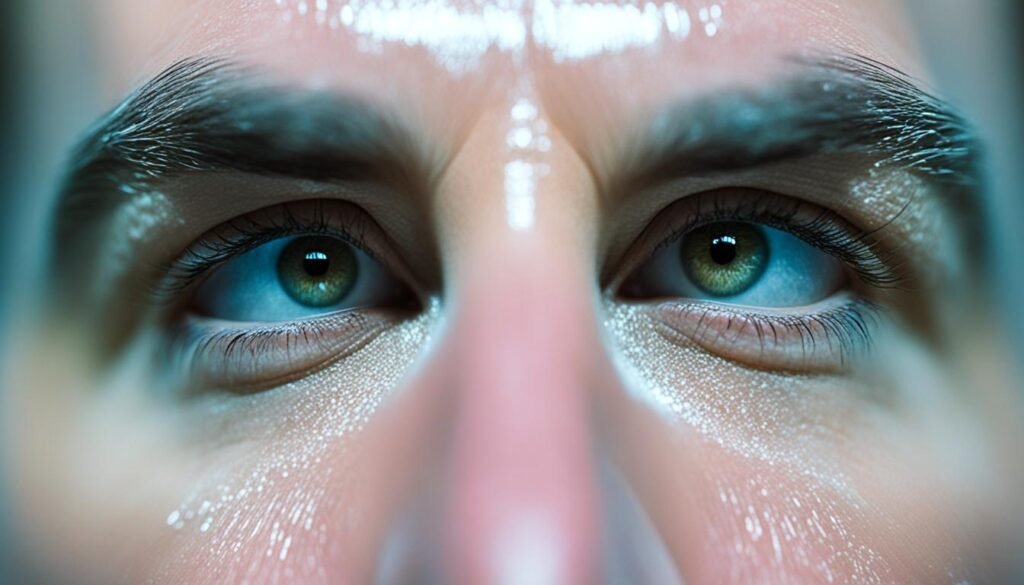
Oily skin is a condition that affects many people. Its main symptom is a shiny, greasy look from too much sebum production. This extra oil can cause pores to look big and increase the risk of clogged pores and blackheads.
Too much sebum mixes with dirt, skin cells, and germs, causing acne blemishes. This extra oil also means makeup doesn’t stay put, leading to a “slick” face. Many people struggle to deal with this problem.
| Symptom | Effect |
|---|---|
| Shiny, greasy appearance | Undesirable, “slick” complexion that is difficult to maintain |
| Enlarged pores | Increased likelihood of developing clogged pores and blackheads |
| Clogged pores | Formation of acne blemishes |
| Excessive sebum production | Mixing with dirt, dead skin cells, and bacteria, leading to acne |
It’s crucial to know the symptoms and effects of excessive sebum production. This is key to creating a good skincare routine for oily skin. By tackling the root issues with a precise plan, oily skin becomes easier to manage. You can have a balanced, healthy skin.
“The key to managing oily skin is to address the root cause – excessive sebum production. By understanding the symptoms and effects, we can develop a tailored skincare routine to restore balance and achieve a more refined, matte complexion.”
Developing an Effective Skincare Routine for Oily Skin Care
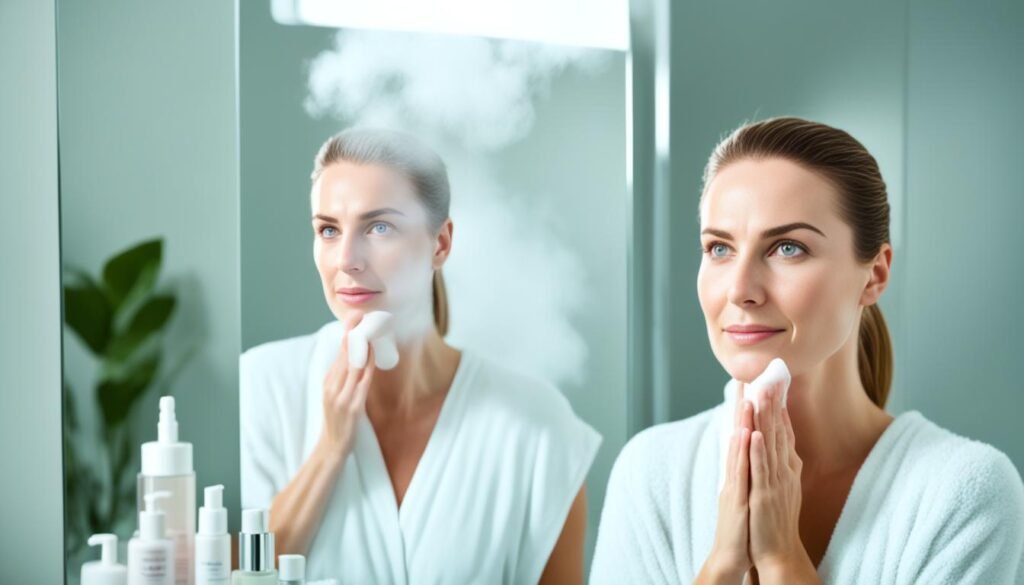
Keeping oily skin under control is tricky. But, you can balance it with the right routine. An effective skincare plan focuses on soft cleansing and using toners smartly.
Gentle Cleansing for Oil Control
For oily skin, cleansing well is key. Pick a gentle cleanser that’s not drying. It should take off extra oil and dirt without removing too much natural skin moisture. Stay away from harsh, foamy cleaners. They can mess up your skin’s protect layer and make it produce more oil.
Clean your face twice daily, in the morning and at night. Doing this makes sure your skin stays fresh. Massage the cleanser into your face softly. Focus on greasy areas and rinse with lukewarm water.
The Role of Toners in Managing Oiliness
Adding a toner to your routine can help a lot with oil. Pick toners with ingredients like salicylic acid or witch hazel. These help keep oil in check and make your pores look better.
Put some toner on a cotton pad. Gently swipe it over your face, especially on the parts that get oily. This gets rid of the final dirt and gets your skin ready for the next steps.
Even though a good skincare routine is vital, don’t cleanse too much or use products that are too drying. Overdoing it can make your skin oilier. Finding the right middle ground is crucial for managing oily skin. This way, you can get a healthy, non-greasy face.
Choosing the Right Moisturizer for Oily Skin Care
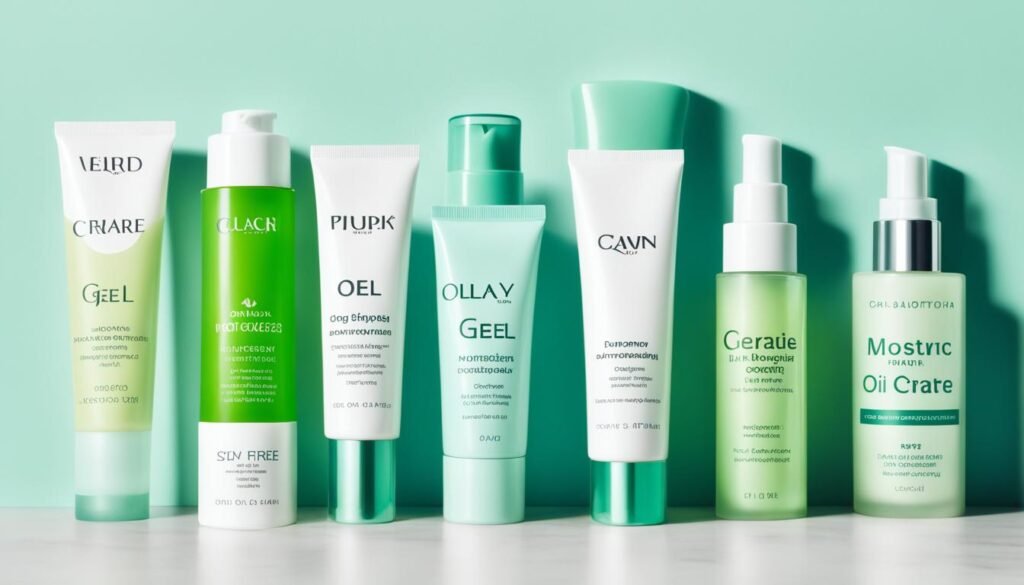
Many with oily skin skip moisturizers, worried they’ll make things worse. But the right moisturizers for oily skin are key for good skin. Look for oil-free, water-based, and non-comedogenic options. These offer light moisture without the greasy feel.
For hydrating moisturizers for oily skin, ingredients like niacinamide and hyaluronic acid are great. They manage oil and keep skin healthy. Avoind thick, creamy moisturizers. They can block pores, making oily skin worse.
Your oily skin still needs moisture for a healthy barrier and to avoid too much oil. Choosing non-comedogenic moisturizers helps. They keep skin hydrated, matte, and healthy.
“Proper hydration is key for managing oily skin. The right moisturizer can help control shine while nourishing your complexion.”
- Opt for oil-free, water-based formulas that won’t clog pores.
- Look for non-comedogenic ingredients that won’t contribute to breakouts.
- Choose moisturizers infused with niacinamide and hyaluronic acid to help control shine.
- Steer clear of heavy, creamy moisturizers that can exacerbate oily skin concerns.
With these tips, finding a great moisturizer for oily skin is easy. You’ll keep your skin healthy, balanced, and free from excess shine.
The Importance of Sunscreen for Oily Skin Types
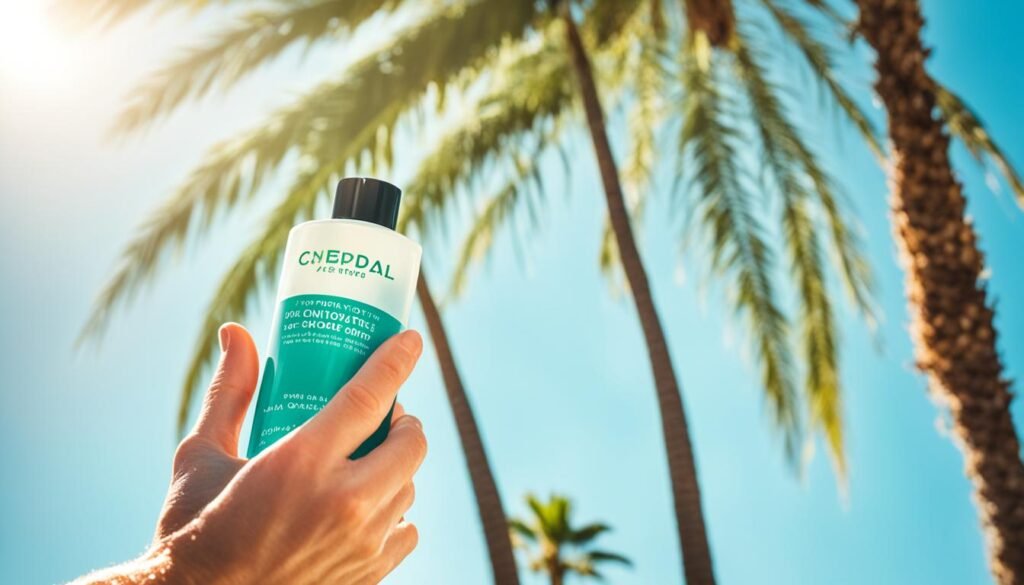
It’s important for everyone to shield their skin from the sun. This is especially true for people with oily skin. The right sunscreen can keep your pores clear and prevent breakouts. Look for sunscreen for oily skin that does not clog pores.
Choosing a good sun protection for oily skin means looking at the SPF. The Skin Cancer Foundation says you need at least SPF 30 for good protection. SPF for oily skin should be high but not make your skin look greasy.
For oily skin, avoid creamy sunscreens. These can make your skin more oily. Choose non-comedogenic sunscreen that is light and oil-free. These are made for people with oily skin and sun exposure.
Using sunscreen right can even make your pores look smaller. It helps prevent sunburn, breakouts, and keeps your skin looking balanced. Putting on sunscreen every day is a big step for healthier skin.
“Sunscreen is the single most important product when it comes to protecting your skin from the sun’s harmful UV rays, regardless of your skin type.”
- Look for non-comedogenic, oil-free sunscreen formulas
- Choose a sunscreen with an SPF of 30 or higher
- Apply sunscreen daily, even on cloudy days
- Reapply sunscreen every two hours, or more frequently if swimming or sweating
Oily Skin Care: Blotting Papers and Their Benefits
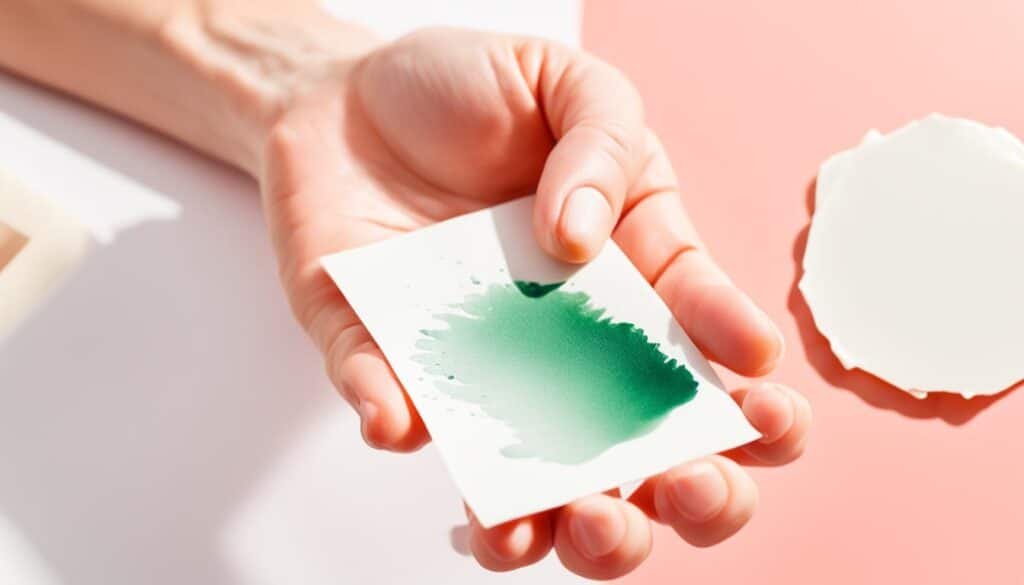
Does your skin get oily quickly? Handling the shine and extra oil can be tough all day. But, there’s a simple solution – blotting papers. They’re thin sheets that you press on your skin to absorb the extra oil. This reduces the oily look and keeps your face matte and refreshed.
Blotting papers are great for those of us with oily skin. You just blot your T-zone and other shiny spots discreetly. This lets you skip the constant powder checks. It helps you look flawless all day long.
Modern blotting papers are a big improvement from the old ones. They are gentle on makeup but tough on oil. These papers absorb the oil without ruining your foundation or powder. They’re key to keeping your skin looking great, even if it gets very oily.
“Blotting papers are a lifesaver for those of us with naturally oily skin. They allow me to quickly and discreetly manage shine without having to reapply my entire makeup routine.”
Many oil-blotting papers also include ingredients like kaolin clay to help control oil. By adding these papers to your daily routine, you’ll have less shine. This means fewer touch-ups and no need for products that can clog your pores.
No matter where your skin gets oily, blotting papers can help. They’re easy to carry and don’t mess up your makeup. These little papers are a must for anyone with oily skin. They help you keep your shine under control and your skin looking fresh all day.
Advanced Treatments for Severe Oily Skin
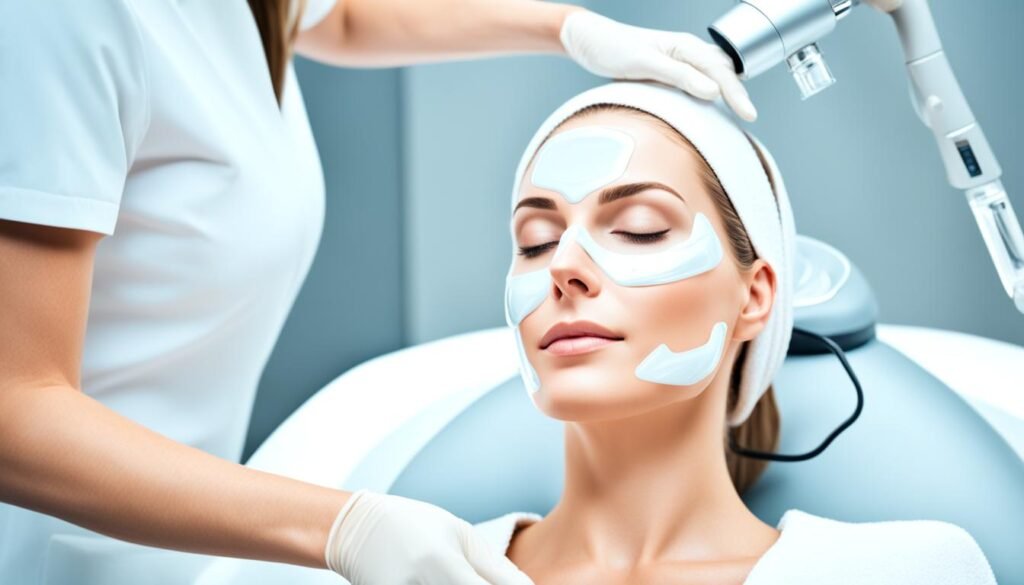
For people dealing with very oily skin that just won’t clear up, many treatments can help. You can get prescription methods that really work on reducing oil and making the skin look better.
Retinoids and Topical Niacinamide
Retinoids like tretinoin and adapalene control oil and make pores look smaller. Topical niacinamide can also regulate oil and give the skin a smoother look. Always use these advanced treatments for oily skin with a doctor’s advice.
Hormonal Birth Control and Spironolactone
If you have oily skin because of hormones, some medications can help. Hormonal birth control and spironolactone can balance hormones, easing excessive oil production. They are effective prescription treatments for oily skin.
A doctor must recommend and check these advanced treatments for oily skin. While they work great, using them the right way with a professional’s help is key for success.
“Prescription-strength solutions can be game-changers for those with persistent, unmanageable oily skin.”
Oily Skin Care: Lifestyle and Diet Considerations

Managing oily skin involves more than just a good skincare routine. Lifestyle and diet choices also have a big impact. Knowing how these factors affect your skin can help a lot. This way, you can create a complete plan for handling oily skin.
Some foods, like simple carbs and processed foods, can make your skin produce more oil. They can even cause acne. But, eating plenty of nutrient-rich foods that are whole and unprocessed is good for your skin. It can help keep oil production in check and make your skin healthier.
It’s not just about what you eat. Drinking enough water and keeping stress low are important too. Hot weather, humidity, and pollution can also make oily skin worse. So, it’s important to avoid these triggers when you can.
While we need more studies, some research hints that changing your lifestyle and diet can help with oily skin. This, combined with a good skincare routine and possibly advanced treatments, can improve your skin health. It’s about taking a full-body approach for the best results.
“The key to managing oily skin is to address both internal and external factors. A combination of a well-designed skincare routine and healthy lifestyle choices can make a significant difference in regulating sebum production and improving the overall appearance of the skin.”
| Lifestyle Factors that Affect Oily Skin | Dietary Factors that Affect Oily Skin |
|---|---|
|
|
Also Read: Effective Skincare For Dark Spots – Achieve Clear Skin
Conclusion
Oily skin can be hard to handle, but understanding its causes helps. It’s important to look at genetics, hormones, and what’s in the environment. By focusing on these, people can make their skin look and feel better.
A good cleaning routine, along with using toners and moisturizers, can control oil. This keeps the skin moist but not too oily. Don’t forget to wear sunscreen daily, as it fights UV damage that makes oil worse.
For tough cases with really oily skin, there are more options. Talk to a doctor about retinoids, niacinamide creams, and certain birth control methods. They could help a lot. Plus, eating well and dealing with stress can also make a big difference.
FAQs
What causes oily skin?
Oily skin happens when your skin’s sebaceous glands make too much sebum. This leads to a shiny look. Genetics, hormones, and outside factors like stress or hot weather can all play a part.
What are the symptoms of oily skin?
Oily skin shows up as shiny and greasy. You might notice your pores look bigger. It’s also more likely to get clogged pores or blackheads. This can make keeping makeup on hard.
How can I develop an effective skincare routine for managing oily skin?
To manage oily skin, a good skincare routine is key. Wash your face twice a day with a gentle cleanser. Use a toner with salicylic acid. Finish with a moisturizer that won’t clog your pores.
Why is it important to use sunscreen for oily skin types?
Sunscreen helps keep your skin healthy. For oily skin, it’s important to use an oil-free, non-clog type. This prevents breakouts and can make pores look smaller.
How can blotting papers help manage oily skin?
Blotting papers are great for oily skin on the go. Just press them gently on your face. They absorb excess oil without messing up your makeup or hurting your skin.
What are some advanced treatments for severe or stubborn oily skin?
If your oily skin is severe, you might need prescribed treatments. These can include retinoids, niacinamide cream, or certain birth control pills. They can all help reduce oil and make your skin look better.
Can lifestyle and dietary factors affect oily skin?
Your diet and lifestyle can change how oily your skin is. Eating too many simple carbs or processed foods can make it worse. This happens with too much stress or living in very hot or humid places. Drinking plenty of water and reducing stress can also make a big difference.




